
21 minute read
Lesson 2 Nature and the Environment
NATURE AND THE ENVIRONMENT
rEaDING & vocabulary
1 Choose the correct word to complete the sentences that describe the world today.
1 The population of the world is (growing / becoming) smaller. 2 Our climate is changing. The world is becoming (colder / warmer). The Arctic ice is melting. 3 (Not everybody / Everybody) has clean water. There are dry places and polluted rivers. 4 We produce (little / a lot of) rubbish. 5 There (are / aren’t) many endangered animal and plant species.
2 Match each sentence in Task 1 with one prediction about the future of the world below.
A lot of people will be thirsty. There will be many more people in the world. They will disappear. Rubbish will pollute the land and the sea. Polar bears won’t have enough space to hunt.
146
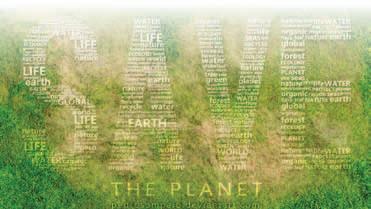
Lesson 2
3 Match the words with the pictures.
1 Climate change 2 Rubbish 3 Growing population 4 Pollution 5 Endangered animals and plants
4 Work in groups. Answer each question and then read the text.
Compare your answers with those in the text. Are they similar? 1 Is population growing in all parts of the world?
The world population is growing. Every day 200.000 people are born on our planet. That’s a lot of babies! In the future there will be many more people and they will need more food, water, houses and energy. Most children are born in poor countries. Many of them don’t have enough food and don’t go to school. In some countries in Europe there are not many children and families are becoming smaller. Do you know anybody who has many brothers and sisters?
147
148 2 Are people responsible for the climate change that is happening?
Something is happening to our climate. It is getting warmer. Our springs and summers are very hot and there isn’t so much snow in winter. The Arctic ice is melting. Earth’s climate has changed many times. There have been ice ages and warmer periods but now these changes are happening fast. Are we responsible for this? Most scientists (but not all) say yes. We need to stop the global warming.
3 Why do we need water? 3 Why do we need water?
Nobody can live without water. Everybody needs Nobody can live without water. Everybody needs it for drinking, cooking and washing. However, it for drinking, cooking and washing. However, for one in fi ve people in the world it is diffi cult to for one in fi ve people in the world it is diffi cult to get clean water. I hope you are somebody who get clean water. I hope you are somebody who turns off the water in the bathroom and in the turns off the water in the bathroom and in the kitchen, and doesn’t leave it running for nothing. kitchen, and doesn’t leave it running for nothing. We must be careful with water. We have to save We must be careful with water. We have to save it. Pessimists say that we won’t have enough it. Pessimists say that we won’t have enough water in the future. We will be thirsty! water in the future. We will be thirsty!
4 Why do we produce so much rubbish?
Our cars and our factories pollute the air. Many rivers and lakes are also polluted. And on land there is rubbish everywhere. It is ugly to see this, and it is dangerous for wild animals. Do we want a world like that? We go shopping and bring home plastic bags. We want new things all the time. We buy a new mobile phone and throw away the old one. When you throw something away, it doesn’t just disappear. Can we do anything about it?
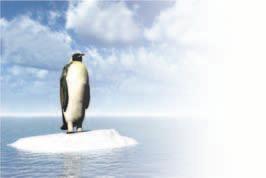

Lesson 2

5 What is the best way to protect endangered animals and plants?
Many plants and animals are in danger. We are destroying the places where they live. The best way to save them is to protect these places. Forest and jungle animals and plants are in danger because we are cutting down trees. It is diffi cult for animals in the sea because the sea is becoming polluted and there is too much fi shing. Polar bears can only hunt on ice, but every year more and more ice disappears. Plants and animals are able to change. It is called evolution. But the evolution is very slow and we are changing our world quickly. Some species will be able to follow the changes. For example, foxes now often come to town to look for rubbish. But many species will disappear.
Vocabulary box
danger [ˈdeɪndʒə]
environment
[ɪnˈvaɪərənmənt] pollution [pəˈluːʃn] to pollute [pəˈluːt] to protect [prəˈtekt] to recycle [ˌriːˈsaɪkl] to reduce [rɪˈdjuːs] to reuse [ˌriːˈjuːz] to save [seɪv]
environmental
[ɪnˌvaɪərənˈmentl]
5 Explain the following headings in newspapers.
The Animal World is in Danger!Help Nature!
Protect the Environment! Think About the Planet!
149
6 Look at the charts below and explain the following.
zzWhat is the environment?
animals plants
land ENVIRONMENT air
people water
zzWhat do THE THREE Rs stand for?
If you care about the environment, always remember THE THREE Rs!
7 a) Read the letters and speak on kids’ opinions about saving the Earth.
150
SAVE OUR PLANET!
chat
I think there are a lot of ways we can help to save the Earth. One way is to remember the three Rs. I save the plastic bags we get at the grocery store and use them again. I save plastic food containers. They make good toys to play in sand and water. Before I buy something, I ask myself the following questions, “Do I really need this? Is it recyclable? If I have to throw it away, will it harm the environment?” I have a bird feeder that I fi ll by myself. I want to be the kid who saves the Earth! Jackie


Lesson 2
SAVE OUR PLANET!
chat
The problem of the environment is much spoken about on TV, radio, and in the newspapers. But my friends and I don’t really talk about it. I know Greenpeace and Friends of the Earth. But in our school we don’t have an environmental programme. There are special magazines about nature. My favourite magazine is the Sport News. I’m in the school football team. We play football twice a week. I’m going to be a football star. Nick

8 Work in pairs to answer the questions.
zzDo you think Jackie is a person who is saving the Earth? Why? zzWhich of the three Rs does she remember to follow? How does she reuse things? zzDoes Nick follow the three Rs rules? Why doesn’t he help to keep the world healthy?
9 a) Copy the grid on page 152. Read the following explanations and match them with the words from the box.
ecology, pollution, energy, cars, the Earth, rainforest, nuclear testing, garbage, environmental problems, animals in danger
1 It is rubbish, waste or other things we throw away. 2 It is a thick forest in tropical parts of the world, like in Amazon area. 3 It is our planet. 4 We have so many of them, like air, sea, and land pollution, holes in the ozone layer and so on.
151
5 They are experiments with nuclear g garbage weapons (like bombs). 6 It is the process of making our environment dirty and unhealthy for living. 7 It can come from nuclear, electrical, solar or wind power. 8 It is a very big problem of our time. If we don’t protect them, they will disappear forever. 9 A great deal of pollution comes from the fumes (gases) they give off. We should walk or use bikes instead, whenever we can. 10 It is the science that studies the relations of plants, animals and people to each other and to their environment.
The fi rst letters of the words give you a name of a very important international organisation which works to protect the environment. b) How many defi nitions can you learn by heart in two minutes? Say them to your group.
lISTENING
1 Here are some questions from the quiz.
How many can you answer?
1 Name at least two examples of a climate change. 2 Name at least two types of renewable energy. 3 What is the greenhouse effect? 4 Which of these gases is not a greenhouse gas: carbon dioxide, methane or oxygen?
152
Lesson 2
5 Complete the three Rs that are important for the future of our planet: reduce, reuse and ... 6 Name at least two consequences of global warming.
AN ECOLOGY QUIZ
DORA 2 a) Listen to the quiz and put the questions in the right order.
b) Listen once again and write the answers in your notebook.
LOVRO
3 a) Listen about the environment protection programme and explain what a ‘green school’ is.
Vocabulary box
a container [k3n9tein3] oxygen [9Aksidz3n] a surface [9sE:fis] a survival [s39vaivl] waste [weist] coastal [9k3Ustl]
153
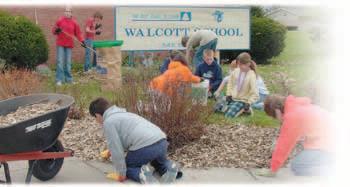
b) In pairs, answer the questions.
4 Examine the scheme and explain what way one can keep the three Rs rules.
1 What is Dee West? 2 Where does she work? 3 How long has she worked there? 4 What is her responsibility? 5 How many children attend the Green Schools? 6 What do they learn at school? 7 Why do you think they call them ‘Green Schools’? 8 What kind of things can be recycled? 9 How do American children protect trees? 10 How can you help to protect the environment?
Toys, mulch, packaging, garbage bags PLASTIC
METAL
ALUMINIUM
Cans, foil, doors, window frames
CLOTH Cans, steel piping, sewer lids
Carpets, blankets, padding
Bottles, jars, bulbs
Newspapers, paper boxes
154
GLASS
PAPER
RUBBER
Tires, auto hoses, carpet padding zzBuy recycled and recyclable items when purchasing new products. zzThis bag is not a toy — keep it away from children. zzThis bag is reusable. zzThis bag is recyclable. zzThis bag can be reused and it is recyclable. zzDo not litter after use.
Do you KNoW?
This logo indicates the item is made from recycled materials.
Lesson 2
This logo indicates that the item can be recycled.
5 Read the tips and report what they want you to do. Work in pairs.
a Put glass bottles to a bottle bank. b Don’t buy products in plastic containers (use bottles, boxes, bags). c Take paper bags into shops. d Don’t throw away plastic bags. Make sure you use them more than once. e Collect and recycle newspapers. f Don’t replace a notebook until it is completely fi lled out. g Don’t take baths. Take quick showers. h Don’t leave the water running while brushing your teeth. i Give away old clothes to someone who may need them. j Walk, use your bike or public transport instead of a car. k Don’t leave the light on when you leave the room. l l Plant trees and fl owers. Plant trees and fl owers.
Example: They ask me to take glass bottles to a bottle bank. They ask me not to buy products in plastic containers.
Report on all the hints.
155
6 a) Listen to the conversation between Lovro and his sister
Dora and say what they are arguing about.
b) Match at least fi ve words on the left with the words on the right. Copy them in your notebook.
c) Listen to the conversation between Lovro and his sister again and tick the pairs of words from Task (a) that
Lovro mentions.
1 waste 2 have 3 plant 4 turn up 5 recycle 6 save 7 leave 8 use a the heating b paper c our planet d the light on e a dishwasher f a bath g water h trees
7 a) Finish the sentences. If necessary, listen again.
1 Dora doesn’t turn off the tap while brushing … 2 She leaves the light … 3 She never puts bottles … 4 She always brings a lot of … 5 She always takes … 6 She always has … 7 She always keeps the TV … 8 She turns up …
b) Give some warnings1 to Dora. Use the examples:
If you don’t turn off the tap while brushing your teeth you’ll waste too much water.
If you don’t switch off the light when you’re not in the room, you won’t save energy.
156
1 warning [9wc:ni60] — застереження, попepeдження
Lesson 2
GraMMar
remember!
Умовні речення 1-ro тuny (Conditional І)
У цьому типі речень виражається умова, за якої може відбутись реальна дія у майбутньому. Вживаємо if + present simple + will або won’t. If people pollute the seas and the air they will become ill.
умова if clause present simple головне речення main clause future simple
If we don’t kill animals we’ll give them a chance to survive. Або We’ll give animals a chance to survive if we don’t kill them.
L K
Після IF ми не вживаємо WILL (future simple) If it will start raining... = WRONG! If it starts raining... = RIGHT
1 Match.
1 If we pollute the air with our cars and factories 2 If people throw rubbish from their cities into the oceans 3 If people get around on foot, by bike or by boat 4 If farmers cut down thousands of trees that are in the tropical rainforests 5 If the air is not clean there won’t be so much pollution in the air. they will kill animals and plants and they’ll disappear forever. you’ll have to wear a mask. we’ll have serious health problems for thousands of people all over the world. they will kill millions of fi sh.
157
2 Remember about Dora and answer the questions with the words in brackets.
1 What will Dora save if she turns off the tap while brushing her teeth? (water resources on the Earth) 2 What will Dora do if she keeps the TV on standby? (save electricity) 3 What will Dora help to do if she always puts the plastic bottles in the bottle bank? (recycle) 4 What will Dora do if she doesn’t turn up the heating all the time (reduce the use of energy) 5 What will Dora do if she uses her knowledge on ecology in practice? (save our planet)
3 Fill in the gaps with the right tenses of the verbs in brackets.
1 If we ... (to have) enough water, we ... (to be) thirsty. 2 More species ... (to survive) if we ... (to protect) nature. 3 We ... (to reduce) the use of natural resources if we ... (to recycle) old and used things. 4 Clean water... (not; to be) a problem if people ... (to stop) throwing rubbish into the seas and rivers. 5 Many animals and plants ... (not; to be) in danger if we ... (to stop) killing the animals and (not; to cut down) the trees.
4 Complete the sentences.
1 If you don’t litter... 2 If we reuse things ... 3 If people clean up after picnics ... 4 If people recycle old magazines and books … 5 If you turn off the lights when you leave a room …
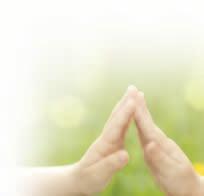
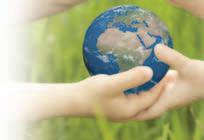
158
SPEaKING Lesson 2
1 Read and guess the meanings of these opinions.
“The greatness of a nation can be judged by the way its animals are treated.”Mahatma Gandhi Mahatma Gandhi “The earth does not belong to man; man belongs to the earth.” Chief Seattle
This means that… This means that…
“To take care of the planet is to take care of our own house.” The Dalai Lama The Dalai Lama This means that…
2 a) Read the defi nitions and guess the meanings of the words
in bold. in bold. When a plant or animal is gone forever, we say it is extinct. The
natural habitat
is a place where an animal or a plant is normally found.
Endangered
species are groups of plants or animals that are in danger of becoming extinct.
159
b) Guess the problems and make sentences.
3 In small groups, do the tasks below. a) Imagine that you’re a member of a team that is working to save 8 endangered species below. Look over the list carefully and then number the animals in the order in which you would try to save them, from 1 (the most important species to save) to 8 (the least important).
The African elephant Panda Rhinos Sea turtles Horn Ivory tusks is are used killed hunted caught eaten endangered for sport. for its tusks. for their horns. by water pollution. for their shell and meat. by other animals. by the disappearance of bamboo. by the growing population of Africa. as a medicine. for making jewellery.
buffalo
cheetah tree frog
elephant
chameleon
zebra
160
peacock leopard
Lesson 2
b) Discuss the questions.
1 What basis did you decide your ranking on: usefulness to humans? beauty? size? species that live in your country? 2 Why are most people more interested in saving larger and more beautiful animals than smaller and less beautiful ones?
Do you KNoW?
Every person produces produces about 650 about 650 tons of garbage during his/ during his/ her lifetime.
Some scientists say that one species of plant, animal or insect becomes extinct every day. In the next 20 years, one-fi fth of all species one-fi fth of all species could become extinct. could become extinct.
We are running out of space in which we can get rid of garbage. One solution to this problem is recycling.
Forests cover 30% of the Earth’s land. They produce oxygen. Protecting all the forests is the all the forests is the key to our survival. key to our survival.
Eight million tons of oil are spilled into the Earths’ oceans every year.
One ton of recycled paper can save 17 trees. Glass produced from recycled glass reduces related air pollution by 20% and water pollution by 50%.
Oceans cover more than 70% of the Earth’s surface. Life began in the oceans. Today, coastal waters have become very polluted, and whales and dolphins are killed in great numbers.
161
4 Read the information and agree or disagree with the statements below.
1 It is important to recycle old paper. 2 Forests are not terribly important for us. 3 Ocean and sea life are in danger. 4 Oil spills are a great source of pollution. 5 Not very many species are in danger of becoming extinct. 6 We still have enough space for garbage. 7 It is environmentally friendly to produce glass from recycled glass. No 1. I agree. We should recycle old paper in order to save woods and forests on the planet.
5 a) Get some information and answer the questions.
Do you know this holiday? Do you think this holiday is for all people all over the world?
162
There are over 300 nature centres in British cities and more than 30 in London. Children go there with their teachers to study and enjoy nature. There are a lot of environment groups in Britain: Friends of the Earth, Greenpeace, London Wildlife Trust, etc. These activities are suggested by Liverpool Ecology Group.
Lesson 2
LIVERPOOL ECOLOGY GROUP
Activities (january - May) jan. 12 How to help Wild
Birds in Winter is explained by Sally
Harkness. jan. 26 How to Build a Bird
Table is explained by Bob
Hopkins. Mar. 8 Water pollution is discussed. May 3 Wild Flowers: the situation in the
countryside is reported on by Janet Symens. May 17 How to Plant a Tree
The report is made by Ann Smales from the World
Wildlife Fund. May 31 How We Can Collect Old Newspapers is discussed.
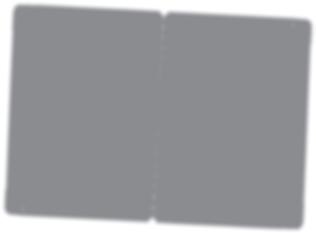
b) Speak on the activities above.
Say which ones you would like to take part in. Explain why.
Vocabulary box
habitat [ˈhæbɪtæt] oxygen [ˈɒksɪdʒən] to preserve [prɪˈzɜːv] to spill [spɪl] to survive [səˈvaɪvl] endangered [ɪnˊdeɪndʒəd] extinct [ɪkˊstɪŋkt] to get rid of [ˈɡet rɪd] to run out of [rʌn aʊt]
I’d like to take part in… … to listen to… Because I’m interested in… I can… It’s important (not) to… I don’t like any of these activities. Because I’m not interested in… I don’t think it’s important. It’s better to…
163
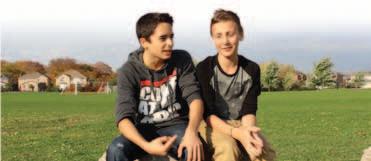
6 Imagine the situation and answer the question. Work in pairs.



In London Zoo there is a problem now. It is very expensive to keep animals. The animals are given to those who can take care of them. zzWhat animal would you adopt? Why?
7 a) Say how you think everyone can show his/her concern with the cleanliness and beauty of the place where he/she lives.
You may use the following:
zzplant greenery; zzprotect trees in parks and yards; zztake care of; zzpreserve a healthy and clean environment; zzkeep the greenery fresh; zznot to pollute with; zzkeep clean; zzcollect rubbish.
b) Speak on your contribution.
What do you do to keep your city clean?
L K
A cause is what produces an effect, which makes a thing happen. A reason is a fact which is put forward as a motive or an explanation in order to justify some conclusion.
164
Lesson 2
8 a) Work in groups.
Sum up the ecological problems and mention their reasons.
b) Play an Ecology Problems Game. Make a list of practical ways to help our planet. Use the words mentioned in the box below.
Problems: Reasons:
Example:
1 We shouldn’t leave the lights on and waste electricity. 2 We should always write on both sides of the paper to save it.

gardens pets trees rivers the sea paper electricity tins bottles petrol animals birds food shopping
c) Speak on your suggestions of the ways out.
The winner will be the group whose list is the longest.
Ways out:
9 a) Learn how to introduce suggestions.

Let’s ... For a start we could ... Why don’t we ... We might ... We could ... Do you think we should ... Do you think we might ... It might be an idea to ...
165
b) Read the following reactions to suggestions.
Divide them into 3 groups: positive, negative and neutral.
Why not?
I suppose you’re right.
What good would that do? That’s a good idea! Now you’re talking. Do you really think that would work?
c) Work in small groups. Use the expressions above in a discus sion about an environmental issue you are interested in.
WrITING
Do you KNoW?
Ukraine is famous for its beautiful nature. There are many picturesque places in the Carpathians and Polissia. Hares and deer, wolves and foxes are part of a wildlife of these areas. There are more than 3,000 lakes with lots of fi sh (like the Shatsk lakes) in the north-west.
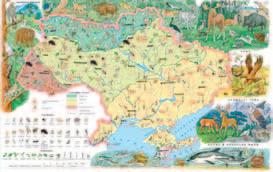
166
Lesson 2
The wolf is the largest member of the dog family. It is one of the most valuable predators. Wolves live in thick forests but their natural habitat is shrinking. The wolf is a negative fi gure in many fairy tales. The main causes of their dying out are: illegal shooting, of their dying out are: illegal shooting, killing on roads and a lack of food. killing on roads and a lack of food.
The white stork is considered to bring good luck in many European countries. However, their number is getting smaller. In many Ukrainian villages storks fl y freely around. Life has shown that with the help of local inhabitants it is possible to preserve the habitats of the stork.
1 Choose animals which are endangered species in Ukraine and write your action plan to protect them.
1 Read about the animals to get information about their lifestyles. 2 Find a map of Ukraine and identify the habitats. 3 Make a leafl et saying that all these animals show the signs of preserved nature. 4 Look for other similar clubs and societies on the Interent. Make contact. 5 See their action plan. Exchange information. Be proactive. 6 Write your action plan with steps which can help to protect these animals.








